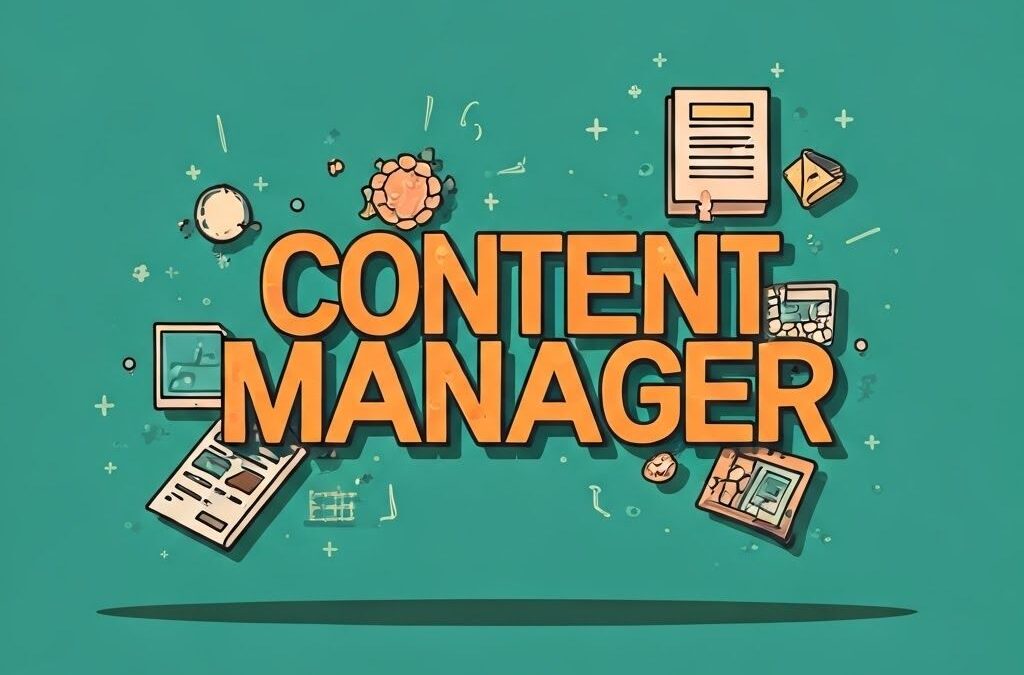A content manager does much more than oversee writing or social media. They take charge of your entire content strategy, from planning content distribution and creation to tracking and refining its performance. They’re responsible for aligning content with your business goals, ensuring it resonates with your target audience, and continuously improving its effectiveness.
In this detailed guide, we’ll explore how content managers can drive business growth through strategic planning, effective execution, and constant optimization.
Understanding the Role of a Content Manager
What Does a Content Manager Do?
A content manager is like a conductor, coordinating the many moving parts of your content marketing efforts. They lead the planning, creation, and management of all forms of digital content.
Their role involves identifying key messages, determining the best platforms for content delivery, using content management systems, and setting schedules to maintain consistency. They also manage writing, designing, and marketing teams, ensuring that the content produced aligns with your brand’s voice and objectives.
Beyond managing, they analyze performance metrics and adjust strategies based on what works and what doesn’t. This cycle of content creation, evaluation, and refinement ensures your content remains relevant and impactful.
Skills That Make a Content Manager Effective
A strong content manager blends creative and analytical skills. Creativity is essential for brainstorming ideas and crafting engaging content. Analytical skills help them interpret data to assess performance and make informed decisions.
Organizational skills are critical for managing multiple projects and deadlines. Communication is equally important, as content managers often serve as a link between different departments. They must clearly convey expectations and feedback to ensure smooth collaboration.
Proficiency in tools like CMS platforms (WordPress or HubSpot), SEO tools (Ahrefs or SEMrush), and analytics platforms (Google Analytics or Hotjar) is also key. These tools streamline processes and provide insights that guide decisions.
1. Developing a Comprehensive Content Strategy for the Marketing and Design Teams
Steps to Build a Strategy
A good strategy begins with setting clear objectives. These could include increasing website traffic, generating leads, boosting sales, or building brand awareness. A content manager collaborates with stakeholders to define these goals, ensuring they align with broader business priorities.
Once goals are established, they conduct audience research to understand preferences, pain points, and behaviors. This insight helps in creating engaging content that speaks directly to the audience’s needs.
The next step is creating a content calendar. This document outlines what content will be published, on which platforms, and when. A well-planned content calendar keeps teams organized and prevents gaps or overlaps in content delivery.
Aligning Content with Business Goals
A content manager ensures that all content serves a purpose. If the goal is to drive sales, they may focus on creating product guides, how-to videos, and case studies that highlight the benefits of your offerings.
If the objective is brand awareness, they might prioritize thought leadership articles, social media campaigns, or engaging storytelling. Each piece of content is designed to move your audience closer to taking action that benefits your brand’s voice and business.
Audience Analysis and Engagement
Understanding your audience is at the heart of any successful strategy. A content manager uses tools like Google Analytics, social media insights, and surveys to learn about your audience’s demographics, interests, and online behaviors.
With this information, they create content that feels personal and relevant. For instance, a younger audience might respond well to short, visually appealing videos on various digital platforms like TikTok, while a professional audience may prefer in-depth articles on LinkedIn.
Ready to unlock business growth by hiring a top-notch content manager?
Contact Growth Hackers
2. Content Creation and Management
Types of Content Managed
Content managers oversee a wide range of content types. Blogs and articles are great for sharing detailed information, while videos and infographics simplify complex topics. Social media posts keep your audience engaged with quick updates and interactive elements.
They may also manage email marketing campaigns, newsletters, case studies, whitepapers, eBooks, and webinars. Each format serves a different purpose and caters to a specific audience need. For instance, a case study can showcase your expertise, while an infographic makes data more digestible.
Industry Best Practices for Quality Assurance
A content manager is responsible for maintaining high standards across all content. They review drafts for clarity, tone, and consistency before publishing. They also fact-check information to ensure accuracy and credibility.
To ensure brand consistency and stay relevant, they keep up with trends in both content and audience behavior. For instance, if short-form videos are trending, they’ll explore ways to incorporate them into your strategy.
To further enhance content quality for global audiences, they implement continuous localization processes, confirming that updates are properly adapted for different languages and cultural contexts.
Tools for Managing Content
The right tools make managing content easier. Content management systems like WordPress help organize and publish content efficiently. Social media scheduling tools like Buffer or Hootsuite allow posts to be planned and automated.
Project management tools like Asana or Trello help marketing teams collaborate and stay on track. Analytics tools like Google Analytics and SEMrush provide insights into performance, helping content managers refine their strategies.
3. SEO Optimization Techniques
Why SEO Matters
SEO is essential for making your content visible to the right audience. Without it, even the best content can go unnoticed. A content manager uses SEO strategies to improve rankings, drive traffic, and enhance user experience.
They focus on both on-page SEO (like keywords and metadata) and off-page SEO (like backlinks). This comprehensive approach boosts your website’s authority and relevance.
Keyword Research and Implementation
Keyword research helps identify the terms your audience is searching for. A content manager uses tools like Ahrefs, SEMrush, or Google Keyword Planner to find these keywords.
Once identified, keywords are integrated into titles, headings, and body text. However, they’re used naturally to avoid keyword stuffing, which can harm your rankings.
Measuring SEO Success
A content manager tracks metrics like organic traffic, bounce rate, and search rankings to measure SEO effectiveness. Tools like Google Search Console and Moz provide detailed insights.
If a particular page isn’t performing well, they might revisit the keywords or optimize the content distribution further to improve its visibility.
4. Performance Measurement and Analytics
Key Performance Indicators (KPIs)
KPIs provide a clear picture of content performance metrics. Common KPIs include page views, time spent on the site, conversion rates, and social shares. Each KPI ties back to your overall goals, helping you measure progress.
Tools for Monitoring Performance
Analytics platforms like Google Analytics, HubSpot, and Hotjar help track user behavior. They show how people interact with your content, which pages they visit most, and where they drop off.
Social media platforms also provide built-in analytics. These tools show engagement metrics like likes, comments, and shares, helping content managers refine their social strategies.
Using Data to Improve Strategies
Data-driven decision-making is a key part of a content manager’s job. If analytics show that videos perform better than blogs, they’ll adjust the content mix.
Similarly, if users leave a page quickly, the manager might rework the headline or improve the page layout to keep visitors engaged.
5. Collaboration and Brand Consistency
Working with Teams
A content manager collaborates with content writers, designers, marketers, and developers. They coordinate tasks, provide clear guidelines, and foster open communication. This teamwork results in content that looks professional and communicates effectively.
Keeping Messaging Consistent
Consistency in tone, style, and messaging builds brand trust. A content manager creates and enforces style guides and brand guidelines that cover everything from word choice to visual design. This ensures that all content, across all platforms, feels cohesive and recognizable.
6. Handling Challenges in Content Management
Common Challenges
Content managers often face tight deadlines, limited budgets, and shifting priorities. They must also adapt quickly to changing audience preferences and industry trends.
Problem-Solving Strategies
To tackle these challenges, content managers set clear priorities and maintain open communication with their teams. They plan ahead but remain flexible, ready to pivot when needed.
7. Continuous Learning and Adaptation
Staying Updated
The digital space evolves quickly, and a content manager keeps up by reading industry blogs, attending webinars, and participating in online communities.
Professional Development
Workshops, certifications, and training programs help content managers stay sharp. By continuously learning, they bring fresh ideas and updated skills to your business.
Maximize your business potential—recruit a world-class content manager now!
FAQ Section
How does a content manager contribute to SEO?
A content manager improves SEO by conducting keyword research, optimizing content structure, and integrating search-friendly elements like meta descriptions and headers. They also monitor performance metrics to adjust strategies for better rankings.
What skills are essential for a successful content manager?
A successful content manager needs strong planning, communication, and creative skills. Analytical abilities and proficiency in tools like CMS platforms and SEO software are equally important for effective performance.
How do you measure the success of a content marketing campaign?
You measure success by tracking key metrics like website traffic, customer engagement rates, lead conversions, and social media interactions. These insights help identify which strategies work and where adjustments are needed.
What tools do content managers typically use?
Content managers rely on tools like WordPress for publishing, Google Analytics for performance tracking, and platforms like Trello or Asana for managing tasks and collaboration. These tools streamline workflows and improve efficiency.
What does a content manager do?
A content manager oversees the creation, organization, and publishing of digital content across various digital platforms. They develop content strategies, ensure consistency in tone and messaging, and manage a team of writers, designers, and marketers. Their goal is to engage audiences, drive traffic, and support business objectives through high-quality content.
How does a content manager work?
Content managers use strategic planning to align content with business goals. They collaborate with teams, manage editorial calendars, and use tools like CMS platforms and analytics software to streamline workflows. They also analyze performance data to refine strategies and deliver better results over time.
Is content manager a good job?
Yes, being a content manager is a rewarding career for those who enjoy creativity, strategy, and collaboration. The role is in high demand as businesses increasingly rely on digital content to connect with audiences. It offers opportunities for growth and skill development in digital marketing, technology, and leadership.
What is content management work?
Content management involves planning, creating, organizing, and publishing digital content. It includes tasks like developing strategies, editing content, optimizing content for SEO, and analyzing performance metrics. This work ensures that businesses deliver consistent and engaging messages to their target audience.
Final Thoughts on the Ways a Content Manager Can Help Your Business Grow
Content management is a cornerstone of modern business operations, streamlining the way organizations plan, create, publish, and analyze their content. From building effective content strategies to utilizing the right tools, it enables businesses to stay organized, deliver valuable messages, and meet audience expectations.
A well-rounded content manager excels by mastering strategic planning, creative execution, and analytical skills. They leverage tools to maintain seamless workflows, enhance team collaboration, and monitor performance metrics effectively. By doing so, businesses can maintain brand consistency throughout, engage their audience, and achieve measurable success in their marketing efforts.
Growth Hackers is a leading content marketing company that has served companies worldwide. We take content management to the next level by combining creativity, strategy, and data-driven insights. Our approach focuses on delivering fast, sustainable, and scalable growth for your business. We are ready to bring your content vision to life and elevate your business to new heights.
We don’t just advise or coach; we partner with you to craft impactful strategies that drive real results.
Your competitors are already working hard to grow their presence, and you should be too.
Contact Growth Hackers today and let us help you design a message that stands out, resonates with your target audience, and establishes your brand as a leader in your industry.








